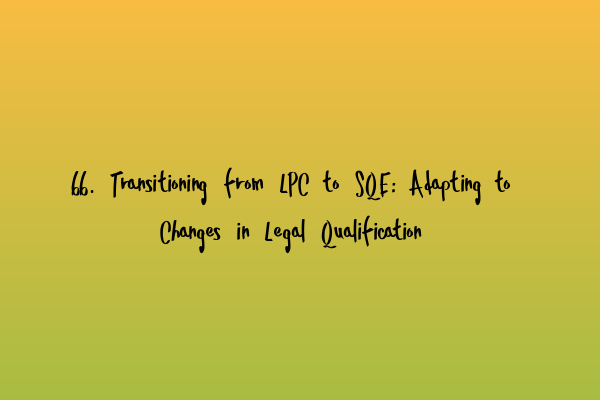Transitioning from LPC to SQE: Adapting to Changes in Legal Qualification
With the introduction of the Solicitors Qualifying Examination (SQE), the legal profession has witnessed a significant shift in the way aspiring solicitors qualify. The SQE, which replaced the Legal Practice Course (LPC), has brought about a series of changes that prospective solicitors need to understand and adapt to.
In this article, we will explore the transition from the LPC to the SQE and discuss how you can smoothly navigate through this new qualification process. Whether you are a law student or a practicing solicitor, understanding the key differences and requirements of the SQE is crucial for your professional development.
1. The SQE: An Overview
The SQE is a two-part examination designed to assess the knowledge and skills required to practice as a solicitor in England and Wales. It is intended to replace the LPC as the standard qualification for entry into the legal profession. The SQE offers a more flexible and accessible route to becoming a solicitor, accommodating a wider range of candidates.
SQE 1 Practice Exam Questions and SQE 1 Practice Mocks FLK1 FLK2 can greatly help you prepare for the first part of the SQE examination, which assesses your functioning legal knowledge.
2. Key Differences and Requirements
One of the significant differences between the LPC and the SQE lies in the way they are structured. While the LPC follows a traditional one-year full-time or two-year part-time format, the SQE does not require a specific course or formal education. Instead, it focuses on the demonstration of competence through passing the examination.
The SQE is divided into two stages: SQE1 and SQE2. SQE1 tests candidates’ legal knowledge through multiple-choice questions and legal research exercises. On the other hand, SQE2 assesses legal skills, such as client interviewing, advocacy, and case analysis. It is essential to note that completion of a two-year period of qualifying work experience (QWE) is also mandatory to qualify as a solicitor.
To prepare for the SQE, you can enroll in comprehensive SQE 2 preparation courses that cover all the essential skills required for this stage of the examination. Additionally, SQE 1 preparation courses can help you sharpen your legal knowledge and improve your chances of success.
3. Adapting and Thriving in the New Landscape
Transitioning from the LPC to the SQE may seem challenging at first, but with the right approach, you can adapt and thrive in the new legal qualification landscape. Here are a few tips to help you on your journey:
a. Stay Updated with SRA Guidelines
The Solicitors Regulation Authority (SRA) is the governing body responsible for regulating solicitors in England and Wales. Keeping up to date with their guidelines, requirements, and changes related to the SQE can provide you with important insights and ensure you are on the right track.
Make it a habit to regularly check the SRA SQE Exam Dates and any other updates on the SRA website to stay informed and avoid missing out on crucial information.
b. Focus on Practical Experience
While the SQE does not require completion of a specific course, gaining practical experience is highly beneficial. Seek opportunities to engage in legal work, internships, or placements to enhance your understanding of legal practice and demonstrate competency in real-world scenarios.
c. Utilize Available Resources
To excel in the SQE, leverage the resources available to you. There are numerous online platforms and study materials that can help you prepare effectively. Take advantage of SQE 1 practice exam questions and SQE 1 practice mocks to familiarize yourself with the exam format and assess your progress.
d. Seek Professional Support
If you find yourself struggling with the transition or need additional guidance, consider consulting a professional SQE tutor or a solicitor who specializes in SQE preparation. They can provide personalized advice, strategies, and resources to help you succeed in the examination.
Conclusion
The transition from the LPC to the SQE brings both opportunities and challenges for aspiring solicitors. By understanding the key differences, meeting the requirements, and adopting the right mindset, you can successfully navigate this new landscape and achieve your goal of becoming a qualified solicitor.
Remember to stay updated with the SRA guidelines, focus on gaining practical experience, utilize available resources, and seek professional support when needed. With the right approach and dedication, you can embrace the changes brought about by the SQE and emerge as a competent and successful solicitor.
